#Sacha Naspini
Explore tagged Tumblr posts
Text
When people ask me what are my tastes in reading, my first impulse is to say "the classics" but then I remember I bought a book from a still living author I had never heard about because the plot had been described to me as "a long phone call between a veterinarian and old lady widow farmer whose emotional support pet chicken has become hypnotised by a washing machine commercial".
#spoiler IT SLAPS#the books is called Nives and is by Sacha Naspini#I should read something else by him#I love me some weird books with bonkers plot#As soon as I heard it I was like I GOTTA HAVE THIS
0 notes
Text
Sacha Naspini "Villa del seminario", presentazione
“Maremma toscana, novembre ’43. Le Case è un borgo lontano da tutto. René è il ciabattino del paese. Tutti lo chiamano Settebello, nomignolo che si è tirato addosso in tenera età, dopo aver lasciato tre dita sul tornio. Oggi ha cinquant’anni – schivo, solitario, taciturno. Niente famiglia. Ma c’è Anna, l’amica di sempre, che forse avrebbe potuto essere qualcosa di più… René non ha mai avuto il…

View On WordPress
0 notes
Text
✨Ecco il secondo gruppo di venti titoli proposti dagli Amici della domenica per la LXXVII edizione del Premio Strega:
▪ Matteo B. Bianchi, «La vita di chi resta» (Mondadori), presentato da Paolo Cognetti.
▪ Olga Campofreda, «Ragazze perbene» (NN Editore), presentato da Gaia Manzini.
▪ Maria Castellitto, «Menodramma» (Marsilio), presentato da Serena Vitale.
▪ Alessandra Fagioli, «Mistero allo specchio» (Robin Edizioni), presentato da Paolo Ferruzzi.
▪ Sara Gamberini, «Infinito Moonlit» (NN Editore), presentato da Chiara Gamberale.
▪ Giovanni Greco, «Bruciare da sola. Una notte di Nadja Mandel'stam con i suoi fantasmi» (Ponte alle Grazie), presentato da Francesco Maselli.
▪ Maria Malucelli, «L’amore nascosto» (Armando Editore), presentato da Antonio Augenti.
▪ Flaminia Marinaro, «L’ultima diva» (Fazi Editore), presentato da Ignazio Marino.
▪ Sebastiano Martini, «Il mare delle illusioni» (Arkadia Editore), presentato da Giovanni Pacchiano.
▪ Paolo Mazzarello, «Il mulino di Leibniz» (Neri Pozza), presentato da Gian Arturo Ferrari.
▪ Matteo Melchiorre, «Il Duca» (Einaudi editore), presentato da Marco Balzano.
▪ Sacha Naspini, «Villa del seminario» (Edizioni E/O), presentato da Paolo Petroni.
▪ Romana Petri, «Rubare la notte» (Mondadori), presentato da Teresa Ciabatti.
▪ Rosella Postorino, «Mi limitavo ad amare te» (Giangiacomo Feltrinelli Editore), presentato da Nicola Lagioia.
▪ Stefano Redaelli, «Ombra mai più» (Neo Edizioni), presentato da Daniele Mencarelli.
▪ Carmela Scotti, «Del nostro meglio» (Garzanti Libri), presentato da Chiara Sbarigia.
▪ Andrea Tarabbia, «Il continente bianco» (Bollati Boringhieri editore), presentato da Daria Bignardi.
▪ Maddalena Vaglio Tanet, «Tornare dal bosco» (Marsilio), presentato da Lia Levi.
▪ Carmen Verde, «Una minima infelicità» (Neri Pozza), presentato da Leonardo Colombati.
▪ Roberta Zanzonico, «La bellezza rimasta» (Morellini Editore), presentato da Giulia Ciarapica.



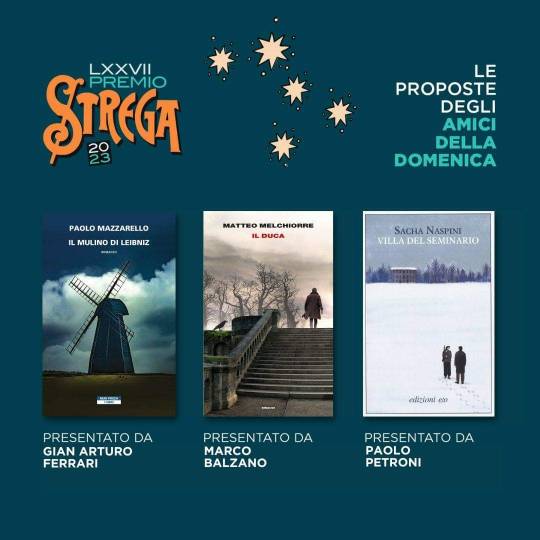

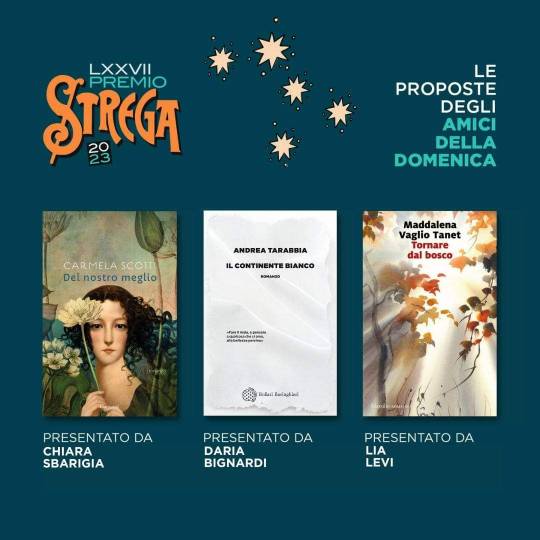

#PremioStrega2023
2 notes
·
View notes
Text
Abbiamo intervistato SACHA NASPINI: Scrittore "Intenso e Tagliente"
0 notes
Text
Libri sotto l’albero

https://chemiguardo.it/cartoline-di-natale-vittoriane/
Grande romanziere mai sufficientemente ricordato, Marco Denevi sa mutare con estrema versatilità lo stile a seconda del personaggio, con umorismo, maestria, opulenza verbale, calibrato dosaggio di citazioni. Non solo. Lo scrittore argentino ha saputo creare un proprio modus operandi: in maniera simile a Rashomon di Kurosawa, in cui ogni attore fornisce una versione diversa dell’accaduto, nelle storie di Denevi, sempre a metà tra narrativa e giallo (ammesso che al giorno d’oggi sia ancora possibile e consentito operare una simile distinzione, e su questo tema rinviamo al prezioso e sintetico saggio di Camilleri), gli eventi sono esposti dai personaggi sulla base del loro singolare punto di vista. La Verità, ovviamente, sarà svelata solo nel finale e apparirà, secondo le migliori regole del giallo, inaspettata e sorprendente. Fino a metà circa del libro, la trama si snoda con tranquillo fluire, anche se l’autore lascia sapientemente cadere indizi sempre più evidenti di una imminente catastrofe. A questo punto la catastrofe temuta si verifica e la seconda parte si dipana in modo diverso: in Rosaura alle dieci ognuno racconta la sua verità in prima persona e con uno stile caratteristico, dalla proprietaria della pensione, donna di mezza età, ciarliera ed emotiva, che si lascia guidare nei suoi giudizi da sentimentalismi, proverbi e luoghi comuni, al coltissimo avvocato che srotola a perdifiato la sua interpretazione dei fatti diametralmente opposta rispetto a quella della locandiera, fino alla ‘confessione’ del presunto assassino sotto forma di dialogo teatrale.

Nella seconda parte di Musica di amor perduto vengono introdotti nuovi, curiosissimi personaggi: un procuratore cripto-omosessuale e un avvocato particolarmente avvenente. La tragedia prenderà, allo stesso tempo, l’aspetto di un noir (un po’ macabro) alla Edgar Allan Poe e di un cold case. Cambiano quindi le figure che si muovono nelle due metà del racconto (il loro legame con la trama sarà svelato a poco a poco), l’intreccio è abilmente elaborato e il finale scaturisce del tutto inaspettato. Originale, coinvolgente e scritto con particolare maestria.

Cerimonia segreta: ricorda, come ha detto Fernando Sorrentino, La caduta della casa Usher di Poe. Nel 1968 Joseph Losey ne ha tratto un film con Mia Farrow, Robert Mitchum e una intensissima Elizabeth Taylor.
Assassini dei giorni di festa (dove giorni è genitivo oggettivo) ci presenta una “molteplice mistificazione”: sei fratelli decidono, per noia o per pura crudeltà, di frequentare le veglie funebri di persone sconosciute “finché si imbattono in un morto senza parenti, in una ricca casa che conserva cimeli di ogni tipo e rinserra il segreto di un morboso amore. E il piano, che quasi automaticamente escogitano per impadronirsi di quelle ricchezze, li costringe a recitare se stessi di fronte a se stessi, a inscenare la loro stessa irredimibile aridità, in una drammatizzazione del cui umor nero, macabro e cattivo, non si rendono conto ma che li trascina in una specie di espiazione che non li illumina e non li emenda”. Umorismo, mistero e tragedia finale compresi in un perfetto meccanismo narrativo.

Sono recentissime pubblicazioni di Adelphi tre libri di Simenon: La mano e due raccolte di racconti. Il giallo è ambientato nel Connecticut e fa vibrare tutte le corde cui l’autore ci ha abituati: lettura a perdifiato e profondo scavo psicologico, al punto che non si ha mai la certezza su chi sia il vero colpevole. L’ambiguità dei personaggi, forse anche nell’autocoscienza, la mancanza di un autentico rapporto partecipativo sia in famiglia sia con gli amici d’infanzia, un sistema di valori basato esclusivamente sul successo non possono che portare all’inesorabile dramma. Una narrazione stringente, priva della stucchevole retorica dei legami affettivi e, finalmente, politicamente scorretta, una storia che fa riflettere sui rischi che si possono correre, Bergman docet, all’interno di un nucleo familiare in assenza di sincerità e condivisione, quando la base dell’unione non è solidificata da sentimenti forti: la mancanza di comunicazione genera pericolosi fraintendimenti dalle conseguenze irreparabili.
Lo scialle di Marie Dudon: dieci racconti, otto dei quali inediti in Italia. Il processo di identificazione nei personaggi instancabilmente cercato da Simenon in tutta la sua sconfinata opera narrativa, nel racconto che dà il titolo alla raccolta trova il suo obiettivo in una lavandaia stanca, con il mal di schiena e le mani terree e squamose a forza di stare immerse nell’acqua. Ma, improvvisamente, le cose cambiano: guardando fuori dalla finestra, ha forse assistito a un omicidio, proprio come Miss Marple dal finestrino del treno in Istantanea di un delitto?

Annette e la signora bionda: inaspettatamente un lieto fine nel racconto che dà il titolo alla raccolta, un “tono lieve e scanzonato, simile a quello di una commedia sofisticata” non frequente in Simenon e che incuriosisce ancora di più il lettore appassionato dell’instancabile inventore del commissario Jules Maigret.
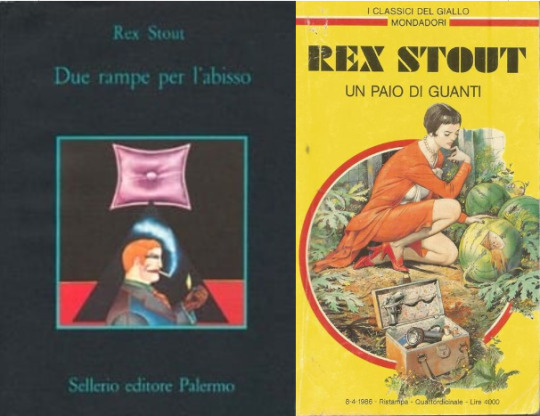
Rex Stout Il guanto: un altro grande giallista che esce dai ranghi. Questa volta è il padre del pantagruelico Nero Wolfe a tradire la sua creatura per dedicarsi a una investigatrice in gonnella, la giovane Theodolinda (alias Dol) Bonner, figlia di un finanziere vittima del crollo di Wall Street, alle prese con un mistero più grande di lei. Sapiente intreccio poliziesco e severa analisi sociale in questo godibilissimo libretto che vi consigliamo insieme al suo ‘parallelo’ Due rampe per l’abisso: uno dei primi lavori, ingiustamente bocciato dalla critica, in realtà si tratta di una costruzione originalissima. La vicenda viene ripensata dal protagonista mentre sale le scale che inesorabilmente lo porteranno alla conclusione della vicenda.
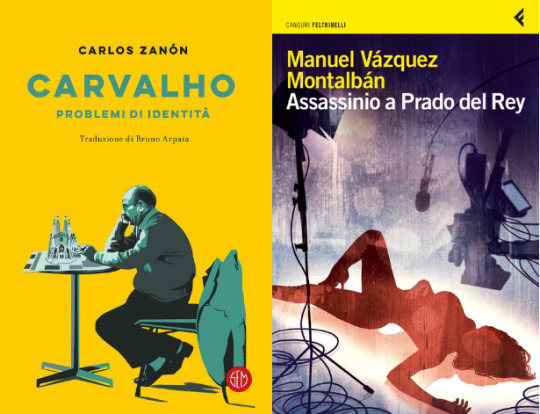
A 18 anni dalla scomparsa, gli editori stanno pescando nel preziosissimo barile degli inediti di Manuel Vázquez Montalbán: Assassinio a Prado del Rey è una delle ultime pubblicazioni, che ci fa rimpiangere la mancanza dell’infallibile, anomalo detective privato Pepe Carvalho. In questa raccolta le qualità dell’ombroso investigatore catalano si dispiegano in tutto il loro repertorio, comprese le grandi abbuffate favorite da vini e liquori di pregio in compagnia del vecchio amico Fuster nella villetta di Vallvidrera. A tal punto incolmabile è il vuoto lasciato da Pepe, che si è pensato di incaricare lo scrittore Carlos Zanón di farlo rivivere: è nato così Problemi di identità, in cui Carvalho si esprime in prima persona (un trucco, spiega l’autore in un’intervista, “per farlo sentire più mio”) e si cimenta in vari filoni di indagine.

E ancora, la raccolta (non-Rocco Schiavone) Ogni riferimento è puramente casuale di Antonio Manzini: lettura estemporanea, divertente e autoreferenziale (il tema è lo stesso di Sull’orlo del precipizio: “una satira spietata … Una distopia alla Fahrenheit 451, dove è il mondo dei libri a bruciare se stesso”), perché certo ci deve essere qualcosa di autobiografico in questi sette racconti ambientati nel mondo dell’editoria (lo si intuisce anche dal titolo). La morale? Vendere l’anima al diavolo e sacrificare l’amore per la letteratura alla squallida legge del profitto forse non conviene. Una struttura ad anello collega la prima all’ultima novella, ma da un punto di vista speculare e con finale rovesciato. La chiusa (L’arringa finale) è un crescendo rossiniano e sigilla questi racconti che con disinvolta originalità passano dal grottesco (Lost in presentation), al thriller macabro (Racconto andino), al paranormale (È tardi), attraverso la rivisitazione dei tradizionali Ringraziamenti, lo studio degli effetti del feng shui applicato ad una libreria (La parete azzurra) e l’invenzione di un acrostico per cavarsi da un impasse piuttosto imbarazzante (Critica della ragione). Inventiva, sfoggio mai pedantesco di erudizione, fantasia lessicale, grande ironia.

È composta da agili libretti la ‘quadrilogia della famiglia’ (a tutt’oggi ancora una trilogia) di Fabio Bartolomei che comprende: Morti ma senza esagerare, che ci farà riabbracciare i nostri genitori con rinnovato affetto, Diciotto anni e dieci giorni, un romanzo di formazione al femminile, e Tutto perfetto tranne la madre, una vicenda drammatica raccontata con ironia e intelligenza.

Chi meglio di Alice Basso, scrittrice e redattrice milanese, ora trapiantata in un borgo medievale del Piemonte, può parlarci con competenza e precisione storica della situazione femminile nell’Italia fascista degli anni ’30? Con questi due recenti lavori, Il morso della vipera e Il grido della rosa, l’autrice inaugura una nuova serie (dopo quella fortunata della ghostwriter Vani Sarca) che ha come protagonista Anita Bo, intelligente dattilografa alle prese con romanzi gialli d’autore, lavoro difficilissimo in un periodo che vedrà presto il Minculpop proibire questo genere letterario, inviso a Mussolini e al fascismo.

Vi consigliamo, infine, l’ultimo libro di Sacha Naspini, La voce di Robert Wright, storia di un doppiatore rimasto improvvisamente orfano del suo alter ego sullo schermo. “Un thriller psicologico sulla disgregazione dell’identità che guarda alla tragedia classica e al teatro dell’assurdo”. L’autore di Nives e Le case del malcontento “con una scrittura che si riconferma ancora una volta densa e avvincente … ci lascia penetrare nella psiche contorta e morbosa di un personaggio espressamente pirandelliano, arricchendo il suo repertorio di figure sempre in bilico tra l’iconico e il grottesco e sempre, in un modo ogni volta diverso, troppo umane”.
#Georges Simenon#fabio bartolomei#sacha naspini#alice basso#manuel vazquez montalban#antonio manzini#marco denevi#elizabeth taylor#Rex Stout#edgar allan poe
13 notes
·
View notes
Text
Island Books Best of 2021: Fiction
Cindy, our beloved and most venerable bookseller, leads off our Best of 2021 with this to say:
“There is much to love about being a bookseller. Where else can you get an employee discount on an entire mega-verse, centuries in the making and ever evolving???
Where else can your boss ask you what you're doing and you can say “I’m looking for Cloud Cuckoo Land” and still get to keep your job???
The rewards are infinite and satisfying except for one thing:
At the end of every year amid the proliferation of lists of the best books of the year I am asked to contribute my thoughts on choosing “The Best Books of the Year”.
It’s hard.
And I don’t like doing it.
But after 27 years in bookselling I have finally figured out how to answer the inevitable question of my favorite books of the year:
My favorite book is the one I’m currently reading and my second favorite is the one I’ll be reading next.
So, when I was asked by my esteemed colleague, Lori (who is arguably the greatest bookseller of her generation and will probably win The James Patterson Award one day, as I did today), for my picks for the best books of the year I said “The Anomaly by Herve Le Tellier” which was what I was currently reading and why I was able to spell his name correctly—the book was right there in my hand.

And how can you not love a book you tear through in two or three sittings? That was this for me. A thought-provoking thrill ride about identical planes with identical manifests, experiencing identical air turbulences from which the planes are identically damaged — the first one landing in the month of March and the second, the “copy plane”, landing the following June.
When the government realizes the 2nd plane to land had already landed several months earlier — well, Government gets Big. The passengers from the second plane are detained at a military air base and the passengers who landed three months earlier are rounded up by government goons and taken to the hangar.
Through the course of the book we meet a handful of the passengers who will be meeting their identical doubles, not “twins”, but human doubles, sharing the same exact everything from moles to memories.
Theorizing abounds — astrophysical, spiritual and existential — but when the news hits the news a little bit of chaos ensues.
The Anomaly is a multi-brid: A little Sci Fi, a bit of mystery, definitely an airplane read, and a flick of chick lit—certainly it’s metafiction (at least as I understand what metafiction is), parody and social satire. It’s kind of funny a little bit sometimes but it’s a serious flippin’ story.
Now for my second favorite book of the year — the one I’m about to start: Cloud Cuckoo Land
Which is why I was looking for it a few paragraphs ago.”
— Cindy
Luckily for Cindy, Cloud Cuckoo Land tops the best of the rest of our fiction list, along with a smattering of YA, a very memorable chicken, and a timely short story collection. See what fiction the staff at Island Books loved in 2021!

Cloud Cuckoo Land by Anthony Doerr
Lori says: “When I picked this up I was ready for a change of pace and Anthony Doerr immediately pulled me into his weaving narrative. Just like All the Light We Cannot See, Doerr has a gentle touch even with serious subjects. His love of books, as objects and conveyers of knowledge, as well as libraries permeates every page.”
And Nancy adds: “This was such a lovely and comforting big book that I didn't want to end. The theme is the power of story, lost fragments and memory, and it is one that resonates in these times.”
Nives by Sacha Naspini; translated by Clarissa Botsford
Caitlin says: “Back in May I declared Nives as one of my favorite books of 2021 and in mid-December that's still true. After Nives's husband dies in an unfortunate farming accident she brings a beloved chicken into her home as a companion. Nives and her chicken watch TV together and keep each other company, when her chicken becomes ill Nives phones the town vet who just happens to be one of her old flames. Gossip! Scandal! Chickens! Set in the Italian countryside.”
Apples Never Fall by Liane Moriarty
Both Laurie and Lori were hooked by Moriarty’s latest domestic thriller, set against the backdrop of competitive tennis. When Joy Delaney goes missing, her four grown children begin to wonder if the young stranger who showed up at their parents’ door one dark night might have some connection to the disappearance. The narrative peels back the layers behind marriage, motherhood, and sibling rivalry with deft insight, while still maintaining a twisty suspense right up until the very end.
The Sentence by Louise Erdrich
Nancy says: “Tookie, a take-no-crap bookseller, is being haunted by an annoying customer's ghost as March 2020 moves her, her family, the bookstore, Minneapolis and the world into a new whole new stage — including the reappearance of her step-daughter with a baby in tow. Erdrich uses a light touch to decribe Tookie's struggle to come to terms with the ghosts of history, personal and generational trauma, and the effects of the pandemic and the protests.”
Good Company by Cynthia D’Aprix Sweeney
Lori wrote about this novel in her Short Take back in April, but for an even shorter take she says: “Utterly absorbing from the first chapter, this is a fascinating story of marriage, friendship and parenthood spans the theater world of NYC and the television studios of LA. Would be perfect for bookclubs — so much to talk about!”
Electric Kingdom by David Arnold
To another Short Take featured in February, Lori adds: “The first great book I read in 2021, and the first one I couldn’t wait to tell people about. Structurally clever, when I finished this I immediately needed to start it again. The storyline is so masterfully plotted, I had to see how David Arnold did it. This is the post-apocalyptic pandemic YA you didn’t know you wanted.”
My Monticello by Jocelyn Nicole Johnson
Nancy observes: “Five stories and one novella that pack a punch! How does she make her stories feel like science fiction, present day reality and historical fiction all at once? I am looking forward to more from this original writer!”
Firekeeper’s Daughter by Angeline Boulley
Lori says: “Before I even finished listening to the excellent audiobook, I texted Lillian to tell her just how much I was loving this YA novel. Boulley manages to balance so many things at the same time with her incisive look into Ojibwe culture and history by a #ownvoices author. She delivers a heart-pounding undercover drug ring thriller, while also following the evolution of Daunis Fontaine, a teen with a foot in two different worlds. Heart-breakingly beautiful.”
Matrix by Lauren Groff
Nancy says: “Marie is the definition of a battle-axe! Banished from Eleanor of Acquitane's court, the 17 year old is packed off to head a crumbling abby of starving nuns. Not expected to live out the year, Marie over the course of 50 years not only turns the abby into a powerful institution, but also creates a practically utopian paradise for women to be separate from the ills of men and society. Groff's writing is at her best!”
We hope you find something new to love on our list and stay tuned for our Best of the Year in Nonfiction titles, coming soon!
— Lori
#island books#lori robinson#anomaly#hervé le tellier#cloud cuckoo land#anthony doerr#nives#sacha naspini#apples never fall#liane moriarty#the sentence#louise erdrich#good company#cynthia d’aprix sweeney#firekeeper’s daughter#angline boulley#my monticello#jocelyn nicole johnson#matrix#lauren groff#best of 2021#fiction
1 note
·
View note
Text
Kindle nel Caribe. Volume 1: "I Cariolanti", Di Sacha Naspini
Kindle nel Caribe. Volume 1: “I Cariolanti”, Di Sacha Naspini
Inizia oggi un nuovo capitolo della saga del LettoreDisoccupato, capitolo che si chiama Kindle nel Caribe, perché quando mi sono trasferito qua ho dovuto lasciare a Bologna il 99% dei miei libri, perciò mi toccherà molto spesso di affidarmi al caro, vecchio, per niente simpatico ebook reader. Vabbè, a parte i brontolii da vecchio scorreggione, oggi mi va proprio di darvi conto di una lettura che…
View On WordPress
0 notes
Text
Unmissable International Crime Fiction Novels from April 2021 onwards
1 April
The Untamable by Guillermo Arriaga
MacLehose Press
A gripping coming of age thriller of vengeance and destiny set between Mexico City's murderous 1960s underworld and the bleak tundras of Canada's most remote province. By the BAFTA-winning screenwriter of Amores Perros.
Yukon, Canada's far north. A young man tracks a wolf through the wilderness. In Mexico City, Juan Guillermo has pledged vengeance.

1 April
Bullet Train by Kotaro Isaka, translated by Sam Marissa
Harvill Secker
Five killers find themselves on a bullet train from Tokyo competing for a suitcase full of money. Who will make it to the last station? A bestseller in Japan, Bullet Train is an original and propulsive thriller which fizzes with an incredible energy as its complex net of double-crosses and twists unwinds to the last station.
15 April
Silenced by Sólveig Pálsdóttir, translated by Quentin Bates
Corylus Books
After a turbulent few years, Guðgeir Fransson is back with the Reykjavík police force and is called on to look into the suspicious suicide of a young woman in a cell at the Hólmsheiði prison. On the surface, it looks like a straightforward investigation. As he digs into the dead woman’s past, he unearths links to a man’s disappearance more than twenty years ago.
My review of The Fox:
15 April
We Trade Our Night for Someone Else’s Day by Ivana Bodrožić, translated by Ellen Elias-Bursac
Penguin Random House
Nora is a journalist assigned to do a puff piece on the perpetrator of a crime of passion–a Croatian high school teacher who fell in love with one of her students, a Serb, and is now in prison for having murdered her husband. But Nora herself is the daughter of a man who was murdered years earlier under mysterious circumstances. And she wants, if not to avenge her father, at least to bring to justice whoever committed the crime.
15 April
How To Betray Your Country by James Wolff
Bitter Lemon Press
Following on from the acclaimed debut novel Beside the Syrian Sea, this is the second title in a planned trilogy about loyalty and betrayal in the modern world. An authentic thriller about the thin line between following your conscience and following orders. James Wolff is the pseudonym of a young English novelist who “has been working for the British government for the last ten years”.
22 April
Trap for Cinderella by Sebastien Japrisot
Gallic Books
A beach house at a French resort is gutted by fire. Trapped inside are two women - one rich and the other poor. Only one of them survives, burnt beyond recognition and in a state of total amnesia. Who is she, the heiress or her penniless friend? A killer, or an intended victim?
29 April
Geiger by Gustaf Skordeman
Zaffre
The landline rings as Agneta is waving off her grandchildren. Just one word comes out of the receiver: 'Geiger'. For decades, Agneta has always known that this moment would come, but she is shaken. She knows what it means. Retrieving her weapon from its hiding place, she attaches the silencer and creeps up behind her husband before pressing the barrel to his temple.

29 April
Facets of Death by Michael Stanley
Orenda Books
Detective Kubu, renowned international detective, has faced off with death more times than he can count... But what was the case that established him as a force to be reckoned with? In Facets of Death, a prequel to the acclaimed Detective Kubu series, the fresh-faced cop gets ensnared in an international web of danger—can he get out before disaster strikes?
29 April
The Girl Who Died by Ragnar Jonasson
Michael Joseph
Una knows she is struggling to deal with her father's sudden, tragic suicide. She spends her nights drinking alone in Reykjavik, stricken with thoughts that she might one day follow in his footsteps.
So when she sees an advert seeking a teacher for two girls in the tiny village of Skálar - population of ten - on the storm-battered north coast of the island, she sees it as a chance to escape.
13 May
Seat 7a by Sebastian Fitzek, translated by Jamie Bulloch
Head of Zeus
Psychiatrist Mats Krüger knows that his irrational fear of flying is just that – irrational. He knows that flying is nineteen times safer than driving. He also knows that if something does happen on a plane, the worst place to be is seat 7A. That's why on his first plane journey in 20 years – to be with his only daughter as she gives birth – he's booked seat 7A, so no one else can sit there. If no one is sat there, surely nothing will go wrong.
My review of Passenger 23 :
https://fictionfromafar.tumblr.com/post/643950323513311232/passenger-23-by-sebastian-fitzek-passenger-23-by
13 May
The Assistant by Kjell Ola Dahl, translated by Don Bartlett
Orenda Books
Oslo, 1938. When a woman turns up at the office of police-turned-private investigator Ludvig Paaske, has accepted a routine case to find evidence of a cheating husband but soon enough his assistant Jack Rivers has been accused of murder. Rivers is no angel, and Paaske must dig deep to find out what’s going on. The secrets he uncovers go all the way back to 1920s Norway when smugglers, pimps and racketeers ruled the Oslo underworld.
20 May
Summertime, All the Cats Are Bored by Philippe Georget, Translated by Steven Rendall
Europa Editions
It’s the middle of a long hot summer on the French Mediterranean shore and the town is full of tourists. Sebag and Molina, two tired cops who are being slowly devoured by dull routine and family worries, deal with the day’s misdemeanors and petty complaints at the Perpignan police headquarters without a trace of enthusiasm. Out of the blue a young Dutch woman is brutally murdered on a beach at Argelès, and another disappears without a trace in the alleys of the city. A serial killer obsessed with Dutch women?
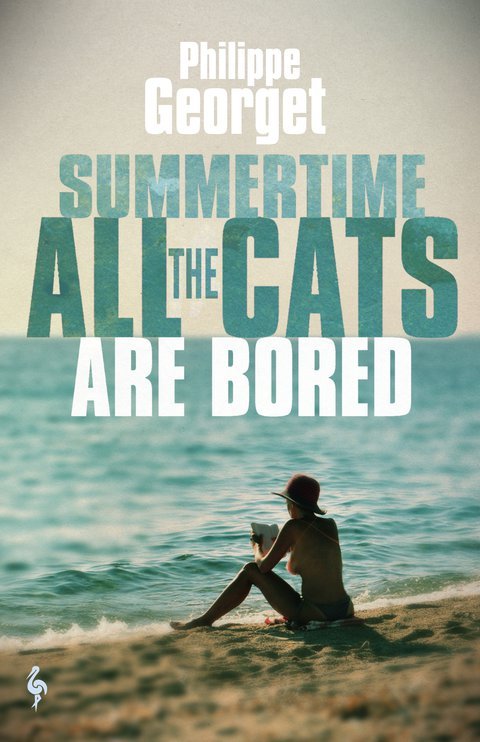
20 May
Oxygen by Sacha Naspini, Translated by Clarissa Botsford
Europa Editions
Laura disappeared into thin air in 1999, at eight years old. She was found in a metal container, fourteen years later.
Luca is having dinner with his father dinner when they are interrupted by a visit from the carabinieri, who take his father away. Luca can only watch the scene unfold, helpless. The charges brought against esteemed anthropologist Carlo Maria Balestri are extremely grave: multiple counts of abduction, torture, murder, and concealing his victims’ bodies.
27 May
The Waiter by Ajay Chowdhury
Harvill Secker
Disgraced detective Kamil Rahman moves from Kolkata to London to start afresh as a waiter in an Indian restaurant. But the day he caters a birthday party for his boss's friend on Millionaire's Row, his simple new life becomes rather complicated. The event is a success, the food is delicious, but later that evening the host, Rakesh, is found dead in his swimming pool.
27 May
The Fortune Men by Nadifa Mohamed
Viking
Mahmood Mattan is a fixture in Cardiff's Tiger Bay, 1952, which bustles with Somali and West Indian sailors, Maltese businessmen and Jewish families. He is a father, chancer, some-time petty thief. He is many things, in fact, but he is not a murderer.
So when a shopkeeper is brutally killed and all eyes fall on him, Mahmood isn't too worried. It is true that he has been getting into trouble more often since his Welsh wife Laura left him. But Mahmood is secure in his innocence in a country where, he thinks, justice is served.
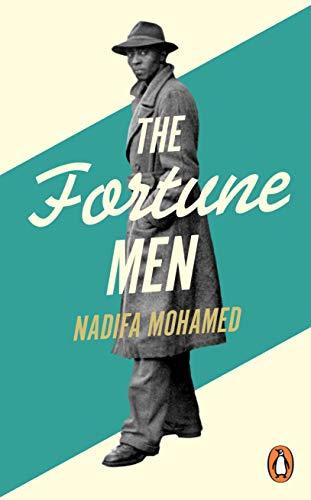
10 June
In the Shadow of the Fire by Herve Le Corre, translated by Tina Kover
Europa Editions
The Paris Commune’s “bloody week” sees the climax of the savagery of the clashes between the Communards and the French Armed Forces loyal to Versailles. Amid the shrapnel and the chaos, while the entire west side of Paris is a field of ruins, a photographer fascinated by the suffering of young women takes “suggestive” photos to sell to a particular clientele. Young women begin disappearing, and when Caroline, a seamstress who volunteers at a first aid station, is counted among the missing, her fiancé Nicolas, a member of the Commune’s National Guard, and Communal security officer Antoine, sets off independently in search of her.
10 June
The All Human Wisdom by Pierre Lemaitre
MacLehose Press
In 1927, the great and the good of Paris gather at the funeral of the wealthy banker, Marcel Péricourt. His daughter, Madeleine, is poised to take over his financial empire (although, unfortunately, she knows next to nothing about banking). More unfortunately still, when Madeleine's seven-year-old son, Paul, tumbles from a second floor window of the Péricourt mansion on the day of his grandfather's funeral, and suffers life-changing injuries, his fall sets off a chain of events that will reduce Madeleine to destitution and ruin in a matter of months.
15 June
The Transparency Of Time, Leonardo Padura, translated by Anna Kushner,
Bitter Lemon Press
Mario Conde is facing down his sixtieth birthday. What does he have to show for his decades on the planet? A failing body, a slower mind, and a decrepit country, in which both the ideals and failures of the Cuban Revolution are being swept away in favor of a new and newly cosmopolitan worship of money. Rescue comes in the form of a new case: an old Marxist turned flamboyant practitioner of Santería appears on the scene to engage Conde to track down a stolen statue of the Virgen de Regla—a black Madonna. This sets Conde on a quest that spans twenty-first century Havana as well as the distant past to uncover the true provenance of the statue.
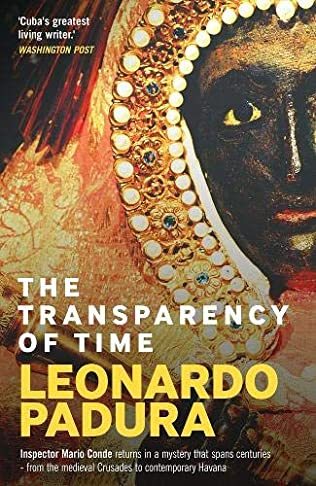
My review of Havana Fever:
https://fictionfromafar.tumblr.com/post/631759758177746944/havana-fever-written-by-leonardo-padura
24 June
The Wrong Goodbye by Toshihiko Yahagi, translated by Alfred Birnbaum
MacLehose Press
In a nod to Raymond Chandler, The Wrong Goodbye pits homicide detective Eiji Futamura against a shady Chinese business empire and U.S. military intelligence in the docklands of recession hit Japan. After the frozen corpse of immigrant barman Tran Binh Long washes up in midsummer near Yokosuka U.S. Navy Base, Futamura meets a strange customer from Tran’s bar. Vietnam vet pilot Billy Lou Bonney talks Futamura into hauling three suitcases of “goods” to Yokota US Air Base late at night and flies off leaving a dead woman behind. My review:
https://fictionfromafar.tumblr.com/post/641412317374988288/the-wrong-goodbye
24 June
Sleepless by Romy Haussmann, translated by Jamie Bulloch
Quercus
It's been years since Nadja Kulka was convicted of a cruel crime. After being released from prison, she's wanted nothing more than to live a normal life: nice flat, steady job, even a few friends. But when one of those friends, Laura von Hoven - free-spirited beauty and wife of Nadja's boss - kills her lover and begs Nadja for her help, Nadja can't seem to be able to refuse.
29 June
Black Ice by Carin Gerhardsen
Scarlet
January in Gotland. The days are short, the air is cold, and all the roads are covered in snow. On a deserted, icy backroad, these wintery conditions will soon bring together a group of strangers with a force devastating enough to change their lives forever when, in the midst of a brief period, a deadly accident and two separate crimes leave victims in their wake.
1st July
The Darkness Knows by Arnaldur Indridason
Harvill Secker
A woman approaches Konrad with new information and progress can finally be made. But as Konrad starts to look back at the case and secrets of the past, he is forced to come face to face with his own dark side. In What the Darkness Knows, the master of Icelandic crime writing reunites readers with Konrad, the unforgettable retired detective from The Shadow District.
1 July
Resilience by Bogdan Hrib, translated by Marina Sofia
Corylus Books
Stelian Munteanu has had enough of being an international man of mystery: all he wants to do is make the long-distance relationship with his wife Sofia work. But when the notorious Romanian businessman Pavel Coman asks him to investigate the death of his daughter in the north of England, he reluctantly gets involved once more in what proves to be a tangled web of shady business dealings and political conspiracies. Moving rapidly between London, Newcastle, Bucharest and Iasi, this novel shows just how easy it is to fall prey to fake news and social media manipulation.
8 July
The Therapist by Helene Flood, translated by Alison McCulloch
MacLehose Press
A voicemail from her husband tells Sara he's arrived at the holiday cabin. Then a call from his friend confirms he never did. She tries to carry on as normal, teasing out her clients' deepest fears, but as the hours stretch out, her own begin to surface. And when the police finally take an interest, they want to know why Sara deleted that voicemail.
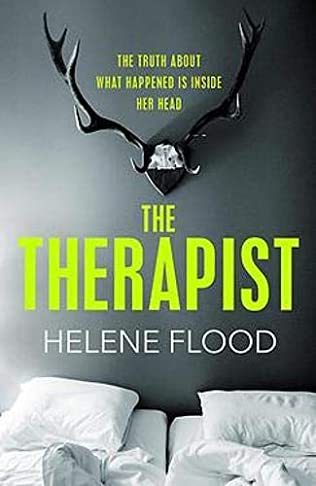
13 July
Elena Knows by Claudia Piñeiro translated by Frances Riddle
Charco Press
After Rita is found dead in a church she used to attend, the official investigation into the incident is quickly closed. Her sickly mother is the only person still determined to find the culprit. Chronicling a difficult journey across the suburbs of the city, an old debt and a revealing conversation, Elena Knows unravels the secrets of its characters and the hidden facets of authoritarianism and hypocrisy in our society.
My review of Betty Boo:
https://fictionfromafar.tumblr.com/post/633225446612484096/
15 July
The Basel Killings
Hansjörg Schneider
Bitter Lemon Press
It the end of October, the city of Basel is grey and wet. It could be December. It is just after midnight when Police Inspector Peter Hunkeler, on his way home and slightly worse for wear, spots old man Hardy sitting on a bench under a street light. He wants to smoke a cigarette with him, but the usually very loquacious Hardy is silent—his throat a gaping wound. Turns out he was first strangled, then his left earlobe slit, his diamond stud stolen. The media and the police come quickly to the same conclusion: Hardy’s murder was the work of a gang of Albanian drug smugglers. But for Hunkeler that seems too obvious.
20 July
The Double Mother by Michel Bussi, translated by Sam Taylor
W&N
Already shown as a serial on Channel4’s Walter Presents (as The Other Mother), four-year-old Malone Moulin is haunted by nightmares of being handed over to a complete stranger and begins claiming his mother is not his real mother. His teachers at school say that it is all in his imagination as his mother has a birth certificate, photos of him as a child and even the pediatrician confirms Malone is her son. The school psychologist, Vasily, believes otherwise as the child vividly describes an exchange between two women.

22 July
Girls Who Lie Eva Bjorg AEgisdottir
Orenda
When single mother Maríanna disappears from her home, leaving an apologetic note on the kitchen table, everyone assumes that she’s taken her own life … until her body is found on the Grábrók lava fields seven months later, clearly the victim of murder. Her neglected fifteen-year-old daughter Hekla has been placed in foster care, but is her perfect new life hiding something sinister?

My Review of A Creak On The Stairs:
https://fictionfromafar.tumblr.com/post/631717704661942273/
22nd July
The Doll Yrsa Sigurdardottir
Hodder & Stoughton
It was meant to be a quiet family fishing trip, a chance for mother and daughter to talk. But it changes the course of their lives forever. They catch nothing except a broken doll that gets tangled in the net. After years in the ocean, the doll a terrifying sight and the mother's first instinct is to throw it back, but she relents when her daughter pleads to keep it. This simple act of kindness proves fatal. That evening, the mother posts a picture of the doll on social media. By the morning, she is dead and the doll has disappeared.
5 August
The Soul Breaker by Sebastian Fitzek, translated by Jamie Bulloch
Head Of Zeus
He doesn't kill them, or mutilate them. But he leaves them completely dead inside, paralysed and catatonic. His only trace a note left in their hands. There are three known victims when suddenly the abductions stop. The Soul Breaker has tired of his game, it seems. Meanwhile, a man has been found in the snow outside an exclusive psychiatric clinic. He has no recollection of who he is, or why he is there. Unable to match him to any of the police's missing people, the nurses call him Casper.
12 August
Cold Sun by Anita Sivakumaran
Dialogue Books
Bangalore. Three high-profile women murdered, their bodies draped in identical red saris. When the killer targets the British Foreign Minister's ex-wife, Scotland Yard sends the troubled, brilliant DI Vijay Patel to lend his expertise to the Indian police investigation. Stranger in a strange land, ex-professional cricketer Patel must battle local resentment and his own ignorance of his ancestral country, while trying to save his failing relationship back home.

August date TBC
Skin Deep by Antonia Lassa, translated by Jacky Collins
Corylus Books
The corpse of an elderly millionaire is discovered brutally scarred with acid burns. Her young lover is the chief suspect but the authorities admit they are baffled. It will take the intervention of private detective Albert Larten to explore all the complexities of desire, and ultimately reveal the truth.
19 August
Come Hell Or High Water by Christian Unge
MacLehose Press
The first in a new Swedish crime series featuring Tekla Berg – a fearless doctor with a remarkable photographic memory
With 85% per cent burns to his body and a 115% risk of dying, it’s a miracle the patient is still alive. That he made it this far is thanks to Tekla Berg, an emergency physician whose unorthodox methods and photographic memory are often the difference between life and death.
30 September
Night Hunters by Oliver Bottini
MacLehose Press
The fourth in the Black Forest Investigations - by the four-time winner of the German Crime Fiction Award. Over the course of several days one hot summer, a female student from Freiburg disappears, a father is murdered in a brutal attack, a teenage boy drowns in the Rhine in suspicious circumstances. It soon becomes evident to Chief Inspector Louise Boni and her colleagues at Freiburg's criminal police that the three cases are connected - and that others are now in terrible danger. Including Boni herself.
07 October
Lemon by Kwon Yeo-Sun
House Of Zeus
Focusing on the unsolved murder of teenage girl, this literary crime novel offers insights into gender, class and privilege in Seoul, and marks the English-language debut for award-winning Korean author, Kwon Yeo-sun.
In the summer of 2002, my big sister Hae-on was murdered. She was beautiful, intelligent, and only nineteen years old. Two boys were questioned, but the case was never solved. Her killer still walks free.

12 October
Bread: The Bastards of Pizzofalcone
by Maurizio de Giovanni
Europa Editions
Sometimes it takes facing a formidable adversary to truly know one’s worth. The Bastards of Pizzofalcone may have found just that: when the brutal murder of a baker rattles the city, they are ready to investigate. There’s nothing they wouldn’t do to prove themselves to their community. But this time the police are divided: for the special anti-mob branch, the local mafia is doubtlessly responsible for the crime, but the Bastards are not so sure and think there may be another reason for the murder of the renowned artisan, whose traditionally baked bread attracted customers from far and wide. A rivalry between the policeman and the magistrate is formed, one that, in the end, will extend to more than just their work lives.
12 October
The Corpse Flower by Anne Mette Hancock
Crooked Lane Books
It's early September in Copenhagen, the rain has been coming down for weeks, and 36-year-old journalist Heloise Kaldan is in the middle of a nightmare. One of her sources has been caught lying, and she could lose her job over it. And then she receives the first in a series of cryptic and ominous letters from an alleged killer.
28 October
Inertia by Camilla Grebe
Zaffre
Inertia is an eerie psychological thriller from the award-winning Swedish bestselling author Camilla Grebe. When 18-year old Samuel finds himself at the centre of a drug deal gone wrong, he is forced to go underground to escape the police and an infamous drug lord.
October date TBC
The Commandments by Oskar Gudmundsson
Corylus Books
On a cold winter morning in 1995, Anton, a 19-year-old boy, met a priest outside Glerárkirkja in Akureyri. After that, he was never seen again. Two decades later a priest is found murdered in the church in Grenivík. When the police investigate the case, they finds that a deacon has also been executed inside Akureyri.
28 October
Cold as Hell by Lilja Sigurdardottir
Orenda Books
Icelandic sisters Áróra and Ísafold live in different countries and aren‘t on speaking terms, but when their mother loses contact with Ísafold, Áróra reluctantly returns to Iceland to find her sister. But she soon realizes that her sister isn’t avoiding her … she has disappeared, without trace.
As she confonts Ísafold’s abusive, drug-dealing boyfriend Björn, and begins to probe her sister’s reclusive neighbours – who have their own reasons for staying out of sight – leads Áróra into an ever darker web of intrigue and manipulation.
28 October
The Rabbit Factor by Antti Toumainen
Orenda Books
What makes life perfect? Insurance mathematician Henri Koskinen knows the answer because he calculates everything down to the very last decimal.
And then, for the first time, Henri is faced with the incalculable. After suddenly losing his job, Henri inherits an adventure park from his brother – its peculiar employees and troubling financial problems included. The worst of the financial issues appear to originate from big loans taken from criminal quarters … and some dangerous men are very keen to get their money back.
2 November
Bricklayers
Selva Almada
Charco Press
Oscar Tamai and Elvio Miranda, the patriarchs of two families of brickmakers, have for years nursed a mutual hatred, but their teenage sons, Pájaro and Ángelito, somehow fell in love. Brickmakers begins as Pájaro and Marciano, Ángelito’s older brother, lie dying in the mud at the base of a Ferris wheel. Inhabiting a dreamlike state between life and death, they recall the events that forced them to pay the price of their fathers’ petty feud.
My review of Dead Girls:
https://fictionfromafar.tumblr.com/post/642554449326489600/dead-girls-charco-press
4 November
The Night Will Be Long
Santiago Gamboa
Europa Editions
When a horribly violent confrontation occurs outside of Cauca, Colombia, only a young boy is around to witness it. But no sooner does the violence happen than it disappears, vanished without a trace. Nobody claims to have seen anything. Nobody claims to have heard anything. That is, until an anonymous accusation catalyzes a dangerous investigation into the deep underbelly of the Christian churches present today in Latin America. The Night Will Be Long is a dark, twisting thriller filled with moments of humor and pain--a story that will stick with readers long after they turn the last page.
11 November
The Shadows of Men by Abir Mukherjee
Harvill Secker
When a Hindu theologian is found murdered in his home, the city is on the brink of all-out religious war. Can officers of the Imperial Police Force, Captain Sam Wyndham and Sergeant Surendranath Banerjee track down those responsible in time to stop a bloodbath? Set at a time of heightened political tension, beginning in atmospheric Calcutta and taking the detectives all the way to bustling Bombay, the latest instalment in this 'unmissable' (The Times) series presents Wyndham and Banerjee with an unprecedented challenge.
#crimeintranslation#crime fiction#european literature#latinamericancrimefiction#Nordic noir#Japanese crime fiction
2 notes
·
View notes
Text
Ossigeno

Ossigeno by Sacha Naspini
Laura scompare nel nulla il 12 agosto del ’99, a otto anni. Viene ritrovata in un container il 6 ottobre del 2013. Adesso di anni ne ha ventidue. Luca sta cenando con suo padre, i carabinieri irrompono, portano via l’uomo. Le accuse mosse nei confronti dello stimato professor Carlo Maria Balestri sono gravissime: dietro la facciata di un antropologo di fama si nasconde il Male. Suo figlio non può che assistere alla scena, impotente. Cosa succede se un giorno scopri che la persona che ti ha generato è un mostro? Ossigeno è la storia di ciò che resta. La cattura del maniaco non è la fine di un incubo: segna l’inizio di nuove vite. L’esperimento perverso del professor Balestri continua: non imprigiona più delle bambine in una scatola di ferro, ci sono altre gabbie con le quali in molti devono confrontarsi. Per esempio quella genetica, del sangue, da cui Luca non ha via d’uscita. E com’è parlare a una figlia sopravvissuta a quattordici anni di reclusione? Laura sorride, si comporta come una ragazza normale. Ma a volte è colta da una sorta di raptus: dopo essersi persa nella città entra in un bar qualsiasi e si chiude in bagno. Se può, resta lì anche per un’ora. È il suo modo per riprendere fiato e poi tornare all’aperto, in apnea. Qualcuno è lì, la sta seguendo e lei lo sa. La domanda che continua a risuonare è questa: chi ha rinchiuso chi? Sacha Naspini porta aria nuova nel romanzo italiano: un soffio di mistero e poesia. Dopo il successo di Le Case del malcontento l’autore offre ai lettori nuove emozioni, nuovi brividi, nuove sorprese e nuovi turbamenti.
Download : Ossigeno More Book at: Zaqist Book
1 note
·
View note
Text
18 Settembre - "OSSIGENO" di Sacha Naspini
18 Settembre - "OSSIGENO" di Sacha Naspini Link Amazon https://amzn.to/32KbZ9Q
Titolo: Ossigeno Autore: Sacha Naspini Genere: Thriller Psicologico Casa Editrice: Edizioni e/o Lunghezza: 176 pagine Prezzo: Ebook €11,99 – cartaceo €13,60 Data di pubblicazione: 18 Settembre 2019
ACQUISTA
Sinossi
Il punto non è che mio padre è mio padre. Il punto è che sono suo figlio.
Sacha Naspini porta aria nuova nel romanzo italiano: un soffio di mistero e poesia. Dopo il successo delle Case del…
View On WordPress
0 notes
Text
Per i Noir Désir né vincitori né vinti. Il perché ce lo spiega Sacha Naspini
Noir Désir – Né vincitori né vinti
Sacha Naspini
Gruppo Perdisa editore
Il primo libro italiano dedicato ai Noir Désir
Il 26 luglio 2003, in un albergo di Vilnius, Bertrand Cantat, leader dei Noir Désir, schiaffeggia a più riprese la sua compagna, Marie Trintignant. La notizia fa il giro del mondo. Marie entra in coma, morirà qualche giorno dopo. Bertrand tenta inutilmente il suicidio. Il…
View On WordPress
0 notes
Text
CASTING COMPARSE PER DOCUFILM "MEMORIA DI FERRO" CON ALESSANDRO HABER
CASTING COMPARSE PER DOCUFILM “MEMORIA DI FERRO” CON ALESSANDRO HABER
Casting call. Per la realizzazione di un docufilm del regista Francesco Falaschi e dello scrittore Sacha Naspini che si intitolerà “Memoria di Ferro” , si effettua casting finalizzato alla selezione di comparse. Nel docufilm ci saranno importanti nomi: da Alessandro Haber a Luigi Fedele e Cecilia Dazzi, protagonista –quest’ultima – del film d’esordio del regista Falaschi intitolato “Emma sono…

View On WordPress
0 notes
Text
#Ioleggoacasa... (soprattutto) durante le feste!

È inverno, il tempo è uggioso, ci sono le restrizioni, perché dovremmo uscire? Fortunatamente le biblioteche hanno riaperto, anche se solo per il ritiro dei libri prenotati, almeno per il momento, secondo le modalità indicate nel nostro sito https://milano.biblioteche.it/. Ricordiamo che è stato attivato anche un servizio di consegna a domicilio per gli over 70 e per chi non avesse la possibilità di recarsi personalmente in biblioteca. Last but not least, siamo stati travolti da una valanga di libri nuovi, tra i quali, ‘cogliendo fior da fiore’, scegliamo quelli da consigliare.

Uscito nel 2019, ma appena arrivato nelle biblioteche il romanzo di Massimo Carlotto La signora del martedì (questo titolo non ci ricorda forse I giovedì della signora Giulia di Piero Chiara, da cui fu tratto uno sceneggiato Rai, naturalmente presente nel nostro Sistema?): un attore porno ‘declassato’ al ruolo di gigolò trascina l’esistenza aspettando il martedì, giorno in cui una donna misteriosa retribuisce le sue prestazioni. Questo libro ci offre il destro per elogiare la nuova serie L’alligatore appena trasmessa da Rai 2, tratta dai gialli di Carlotto che ne cura anche la sceneggiatura: complimenti davvero, ben fatta, ottimamente interpretata, colonna sonora per palati fini (come commenta il protagonista stesso: “Il blues non è per tutti”) e magnifica fotografia, con la laguna veneta in HD mai vista così bella!
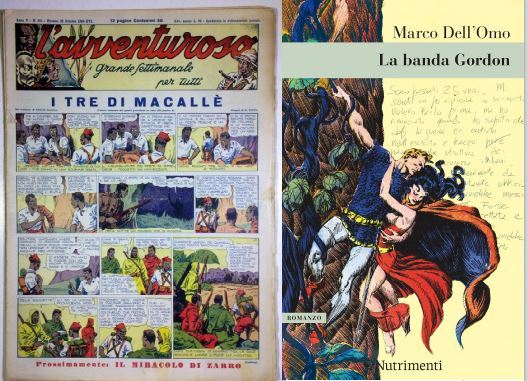
Fresco fresco di biblioteca è La banda Gordon di Marco Dell’Omo: un romanzo corale, ricco di avventure, anche molto divertenti, e di personaggi, ambientato nell’epoca fascista, periodo che sembra ispirare quanto altri mai i nostri scrittori contemporanei. “Un generale ormai anziano ripercorre la giovinezza trascorsa durante la guerra sulle montagne d’Abruzzo. Con lui una banda di coetanei decisa a vendicare il fumetto preferito (Flash Gordon) incappato nella censura fascista.” Sull’argomento consigliamo anche questo articolo relativo alla storia della casa editrice Nerbini di Firenze che il 14 ottobre 1934 pubblicò il primo numero di «l’avventuroso» che ospiterà per qualche anno Flash Gordon (e anche Mandrake e The Phantom, poi ribattezzato, più ‘italianamente’ L’uomo mascherato) per sostituirlo nel 1938 con I tre di Macallè, fumetto più in linea con l’ideologia del regime ma di minore impatto sul pubblico.
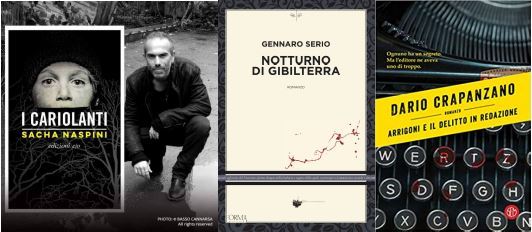
Come sempre ambientato a Milano, e in particolare nella zona di Porta Venezia, Arrigoni e il delitto in redazione di Dario Crapanzano: un capo redattore viene trovato con la gola squarciata e il commissario Arrigoni, sbirro sui generis, è chiamato a indagare. L’ultimo giallo di Crapanzano (che purtroppo ci ha lasciato nel mese di ottobre), forse anche il più autobiografico, perché ambientato nel mondo dell’editoria che l’autore conosceva bene. “Milano e l’editoria milanese hanno perso tanto, ma i lettori potranno ancora una volta deliziarsi con l’ultima delle storie di Arrigoni e di Crapanzano, scritta come sempre con garbo, con ironia, con passione e con lungimiranza. Un giallo vero, classico, con la giusta suspense e il giusto finale, un giallo come se ne trovano ormai pochi.”
Un’opera prima di grande successo (Premio Italo Calvino) è il giallo meta-letterario Notturno di Gibilterra del giovane Gennaro Serio. “Sospinto da uno stile versatile e sorprendente, Notturno di Gibilterra mette in atto un furibondo sabotaggio del genere più letto e amato: il giallo ... Un ‘ipergiallo’ giocoso e diabolico che attraverso una sapiente rete di divertiti omaggi e ghiotte citazioni porterà il lettore dai canali delle Fiandre al Baltico, dall’Accademia di Svezia alla Patagonia, per approdare infine a Gibilterra, dove marginali poeti allo sbando rivendicano uno spazio a quella materia incandescente che è la letteratura.”
È stato definito romanzo di ‘deformazione’ I cariolanti di Sacha Naspini, ambientato nella campagna toscana: un disertore della Grande Guerra si nasconde in una tana nel bosco insieme alla moglie e al figlio Bastiano, il vero protagonista della storia. Bastiamo cresce in mezzo alla natura, si innamora, sperimenta il carcere e poi il secondo conflitto mondiale: una vita intera da animale braccato, in preda agli istinti più primordiali, alla ricerca di tutto quello che gli è mancato nella vita.

Per quanto riguarda la sezione di saggistica, ecco le nostre proposte. Una novità interessante e curiosa è la collana, presente nel nostro Sistema, Passaggi di dogana, di cui vi segnaliamo solo qualche titolo: A Londra con Sherlock Holmes, A Parigi con Colette, A Roma con Alberto Sordi, A Dublino con James Joyce, La Genova di De André, A Napoli con Totò. Un approccio diverso per approfondire la geografia e la storia di alcune grandi città.

Un mito è sempre fonte di ispirazione e in questo caso Vanna Vinci ha elaborato la leggenda del più grande soprano di tutti i tempi in una versione a fumetti, in cui la protagonista appare come un personaggio da tragedia greca (la sua interpretazione in Medea di Pasolini è memorabile) con tanto di coro in sottofondo. Io sono Maria Callas è un modo sicuramente originale per rileggere la biografia di una figura leggendaria e indimenticabile.
L’Italia di Mussolini in 50 ritratti di Paolo Mieli e Francesco Cundari: una angolazione ‘atipica’ per analizzare, anche con il contributo delle illustrazioni di Ivan Canu, uno dei periodi più controversi della nostra storia: chi era Mussolini, quale Italia ha preso in mano e come l’ha restituita, quali sono i personaggi che hanno influito sulla sua ascesa, sul rafforzamento del suo potere e chi invece lo ha combattuto? Questi sono gli interrogativi a cui gli autori cercano di dare una risposta.
“Imbalsamare i greci e i romani li ha privati della loro forza, cioè della loro conflittuale modernità” scrive Luciano Canfora nella nota introduttiva a Vivere con i classici. E proprio la conflittuale modernità dei classici è il tema di questo libro: racconti e riflessioni di diversi scrittori contemporanei in forma narrativa. Alicia Giménez-Bartlett, Francesco Cataluccio, Daria Galateria, Fabio Stassi, Roberto Alajmo, Scott Spencer si sono impegnati in questa moderna versione della difesa dei classici, dal momento che, ormai, anche Perché leggere i classici di Italo Calvino è diventato un classico… Ma cos’è un classico? Una garanzia, nell’incertezza del tempo presente.
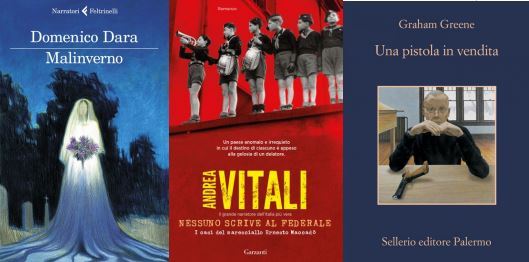
E a proposito di classici, come abbiamo ricordato in un post precedente, Sellerio sta ripubblicando, tra gli altri autori, Graham Greene, di cui citiamo Una pistola in vendita, della serie I divertimenti. Il titolo si riferisce a un killer incaricato di commettere uno spietato omicidio. Ma questo è l’unico dettaglio che il libro ha in comune con altri dello stesso genere, Greene è infatti originalissimo nel tratteggiare la figura del sicario (secondo le sue stesse parole, è compito dello scrittore saper “rendere simpatiche persone che non hanno alcun diritto alla simpatia���), come originale e avvincente è la storia, ambientata alla vigilia della guerra. Imperdibile!
L’ultimo altro giallo di Andrea Vitali, della serie I casi del maresciallo Ernesto Maccadò, è Nessuno scrive al Federale (titolo ricalcato da Nessuno scrive al colonnello di García Márquez). Diversi avvicendamenti di segretari della sezione locale del partito a Bellano, la città più inquieta tra quelle che punteggiano le rive del lago di Como, letterarie per eccellenza.
Dulcis in fundo, la storia di un bibliotecario part-time, al quale il Comune di Timpanara per cui lavora affida il doppio incarico di guardiano del cimitero. “Lettore dalla vivida immaginazione, Astolfo Malinverno mescola le storie dei romanzi – per i quali inventa nuovi finali – con quelle dei compaesani, dei forestieri, dei lettori della biblioteca e dei visitatori del cimitero, dei vivi e degli estinti.” Malinverno di Domenico Dara è un romanzo per chi ama i libri, la fantasia, le storie d’amore, il mistero.
Ancora i migliori auguri di Buone Feste da tutti noi!
#massimo carlotto#piero chiara#l'alligatore#dario crapanzano#marco dell'omo#l'avventuroso#gennaro serio#sacha naspini#passaggi di dogana#vanna vinci#maria callas#paolo mieli#luciano canfora#italo calvino#fabio stassi#graham greene#andrea vitali#domenico dara
12 notes
·
View notes
Text
Why Did The Chicken Befriend The Widow? Find Out In This Plucky Italian Novella
Why Did The Chicken Befriend The Widow? Find Out In This Plucky Italian Novella
The chicken made me read it. It’s not often that I can pay tribute to a book in those words, but Nives, a short novel by Italian writer Sacha Naspini newly translated into English, won me over in its opening pages where a freshly widowed older woman living on a remote farm in Tuscany decides to soothe her loneliness by bringing a chicken into the house for company. The hen, called Giacomina,…

View On WordPress
0 notes
Photo

Bastiano fa una bella chiacchierata con Laura Salvadori (grazie!) su @thrillernord 🐾 http://thrillernord.it/intervista-a-sacha-naspini-3/?fbclid=IwAR1jPt8yqXw4gNjeoQ1CkkokanHbv-MZaazyvLd6-VbBRtCUJpEgLN6EeVY #icariolanti @edizioni_eo #EdizioniEO https://www.instagram.com/p/B-Keb3Yo-xE/?igshid=1dgh1uibx0w9m
0 notes
Photo
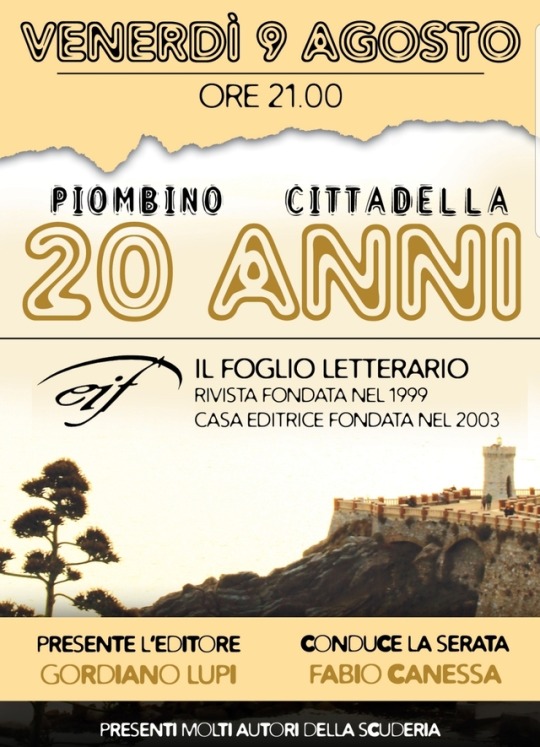
Vent’anni di Foglio Letterario
Sembra ieri che abbiamo cominciato questa avventura di pubblicare una rivista letteraria e qualche anno dopo siamo passati a editare libri. Sembra ieri ma sono trascorsi vent’anni, così lunghi e intensi da volare via in un batter d’occhio, ché se ti guardi indietro pare tutto un interminabile istante. Eravamo quattro amici al bar, direbbe la canzone, se ne sono aggiunti altri, moltissimi sono cambiati, ma l’anima underground del Foglio Letterario resta quella del maggio 1999, del mitico numero uno di una rivista stampata in parrocchia in uno spartano formato A4. Ne abbiamo fatte di cose in vent’anni: concorsi letterari, pubblicazione di giovani autori, partecipazione a fiere, eventi, presentazioni, senza mai cambiare pelle. Abbiamo cominciato contando solo sulle nostre forze e siamo ancora qui a lottare contro l’editoria a pagamento, contro le facce di bronzo che si fanno grandi con i soldi degli altri, contro il dilettantismo allo stato brado e l’improvvisazione. In questi ultimi tempi abbiamo rivitalizzato la rivista (nostra anima) grazie a Vincenzo Trama, che la dirige con passione, alternando il nuovo con il vintage, ripubblicando perle del passato, numeri storici, supplementi, dando spazio a nuove firme con alcuni contributi selezionati. Trovate tutto su www.ilfoglioletterario.it. Ne vale la pena, credete. Letteratura e approfondimenti a costo zero, senza un inserto pubblicitario, tutto per passione, senza secondi fini. Vent’anni e dieci partecipazioni al Premio Strega, non è un vanto ma è cosa da ricordare: sette autori del Foglio (Virani, Saba, Volpe, Guerri, Altamura, Izzo, Ciccone) e tre mie presentazioni con libri editi da altri editori (Calcio e acciaio, Miracolo a Piombino, Sogni e altiforni). Viste le nostre dimensioni, partecipare significa dire che abbiamo gareggiato alla pari con gli altri, più ricchi e potenti, piccolo Davide che sfida Golia. Abbiamo scoperto e lanciato molti autori nell’olimpo della grande editoria - spesso grande per capitali disponibili, non per spirito di ricerca -, che resta il nostro scopo principale. Basti citare Lorenza Ghinelli, autrice di successo Rizzoli, da me scoperta con Il divoratore e Sacha Naspini, ancora in catalogo con L’ingrato e I sassi, approdato a E/O con Le case del malcontento. Wilson Saba, apprezzato autore Bompiani, è stato il nostro primo giovane di valore: finì undicesimo al Premio Strega con Sole e baleno, nel 2003, subito dopo è entrato in Bompiani e da un po’ di anni fa parte degli Amici della domenica. Farei un torto a tutti i bravi componenti della scuderia del Foglio se citassi altri, perché ogni nostro libro è stato scritto da un autore che ha qualcosa da dire ed è stato pubblicato dopo accurata selezione. Il successo è qualcosa di molto aleatorio, non sempre concorda con la qualità, visto che ottimi scrittori vengono pubblicati da piccoli editori. Possiamo dire con vanto di aver fatto vent’anni di editoria onesta, aggiungendo che non è la stessa cosa di onesta editoria, perché ci siamo impegnati a non scendere mai a compromessi, a non chiedere contributi agli autori, a non scegliere strade facili per ottenere lo scopo perseguito. Il Foglio Letterario pubblica due collane di Cinema - quella storica è diretta da Giovanni Modica - uniche sul mercato editoriale italiano, cercando di valorizzare fenomeni culturali popolari (horror, western, noir …), registi e attori italiani da non dimenticare (Deodato, Fulci, Mattei, Argento, Jacopetti, Di Leo, Gloria Guida, Franco & Ciccio …). Non solo, si occupa di saggistica alternativa in campo musicale (black metal, rock, dark …), traduce scrittori cubani, pubblica narrativa per ragazzi (Antonino Genovese dirige la collana omonima ed è autore di punta) e persino poesia (curata e selezionata da Fabio Strinati). Tutto questo senza aver mai tentato di trasformare un’editoria di pura passione in un mestiere, ché la casa editrice è espressione di compositi amori culturali presenti tra collaboratori e redattori. Forse è per questo che quando partecipiamo a una fiera del libro ci rendiamo conto che in vent’anni abbiamo perso tanti compagni d’avventura. Forse è per questo che noi siamo rimasti e altri hanno abbandonato. Forse è per questo che non abbiamo mai pensato di modificare il nostro spirito underground, che ci ha sempre animati. A proposito di fiere del libro, ne facciamo ancora alcune, solo piccole e medie, più vicine alla nostra realtà, dopo aver sperimentato persino il Salone del Libro di Torino, che lasciamo ai colleghi bisognosi di pubblicizzare la loro vanità. In compenso facciamo da sempre la Fiera del Libro di Pisa - che consideriamo la nostra fiera, visto che siamo nati insieme - e quella di Imperia, senza dimenticare che Antonino Genovese si è inventato una bella realtà a Gioiosa Marea, in provincia di Messina. Patrizio Avella è un collaboratore che fa parte della nostra famiglia da circa cinque anni, viene dalla Francia ma è di origini italiane, si occupa di marketing, scrive thriller ed è esperto di cucina. Grazie al suo camper e alla sua disponibilità ci spostiamo in giro per l’Italia e siamo presenti a eventi che prima non riuscivamo a fare. Inoltre abbiamo ampliato l’attenzione alla nostra realtà locale, curando libri su storia, tradizioni, personaggi, cultura maremmana in generale e piombinese in particolare. Piccolo è non solo bello ma fondamentale; non dimenticare le nostre radici, come diceva il buon vecchio Proust, è non solo basilare ma vitale. Non so se resisteremo altri vent’anni, ma non dubitate che - come i personaggi dei nostri western preferiti - venderemo cara la pelle.
0 notes